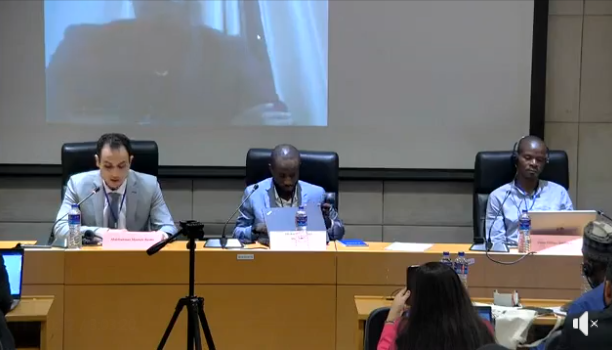A panel discussion titled “Safeguarding Civil Liberties: Addressing the Challenges of Freedom of Assembly, Expression, and Movement” was held during the recent NGOs Forum, which preceded the 81st ordinary session of the African Commission on Human and Peoples’ Rights (ACHPR). This forum provided a crucial platform for civil society organizations to address the alarming restrictions on fundamental freedoms across Africa. The session was moderated by Elisha Mutabunga, a Lobby and Advocacy Officer and researcher in security governance at SOS Multisectoral Legal Information in the Democratic Republic of Congo (DRC).
Key Contributions
Abdelrahman Mostafa Basha, Programs Manager and Specialist in African Affairs at ACHPR, provided an overview of the civic space in North and East Africa. He noted improvements in some areas, such as Mauritania’s rise to 33rd globally in 2024 due to policy reforms. However, he highlighted ongoing challenges, including Morocco’s 88th ranking where journalists face prosecution under restrictive laws. Basha expressed concern over Tunisia’s new laws limiting freedoms, Libya’s absence of elections and legal systems, and Algeria’s constraints on foreign media funding. He emphasized Algeria’s draft laws targeting journalists and human rights defenders and discussed the dire situation in Sudan, where over 60,000 incidents of violence have been reported alongside widespread torture of detainees. In Ethiopia, he cited 594 human rights violations, including arrests of international journalists.
Ondo Olibiyo Sentiment from Human Gabon shared personal experiences regarding threats faced by human rights defenders. He criticized the lack of respect for international conventions protecting these rights, citing a UN report that documented 71 journalists killed in 2023. Olibiyo condemned anti-terrorism and cybercrime laws that restrict freedom of expression and highlighted the perilous conditions for journalists exposing corruption and poor governance. He contrasted countries with term limits like Ghana and Nigeria with those where leaders cling to power, leading to military coups. Olibiyo urged the African Union to take decisive action against states violating good governance principles and called for ECOWAS to support civil society efforts.
Bahati Ruban from the International Peace Centre in Uganda addressed the shrinking civic space in the DRC, where armed groups cause widespread conflict. He underscored the dangers faced by human rights defenders who often endure torture or death. Ruban shared instances of journalists imprisoned without charges and highlighted restrictions on peaceful assembly. He called on civil society organizations (CSOs) to implement effective measures to protect human rights defenders and urged both the African Union and the international community to ensure stability in the DRC.
Participants’ Interventions
During the discussion, participants raised critical issues concerning civil liberties:
- A participant from North Africa expressed concern about the death penalty in Algeria, where 39 individuals were sentenced this year for their religious beliefs, urging respect for NGO rights.
- Another North African participant highlighted human rights violations in Egypt, calling for UN intervention against amendments restricting freedom of expression and peaceful assembly.
- A Nigerian participant referenced a recent protest where participants faced treason charges, stressing the necessity for African states to uphold freedom of assembly.
- A participant from Benin criticized the international community for financially supporting military regimes that ignore human rights violations, particularly against the Fulani people in the Sahel region.
The panel discussion underscored a collective urgency to address the challenges facing freedoms of assembly, expression, and movement across Africa. The contributions highlighted systemic issues that hinder civic engagement and threaten human rights defenders. The call for regional cooperation among organizations like the African Union and ECOWAS was evident as participants emphasized the need for accountability and reform to safeguard civil liberties in an increasingly restrictive environment.


